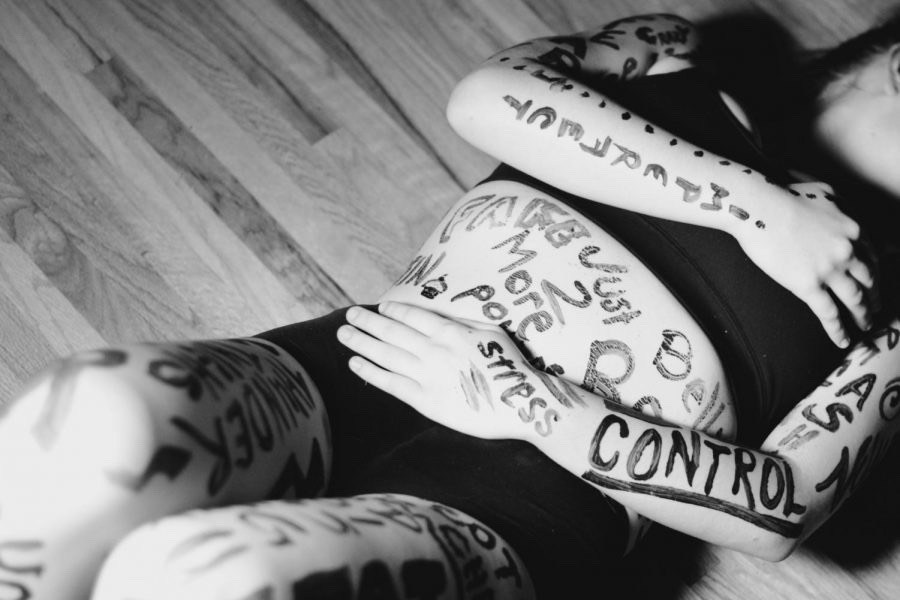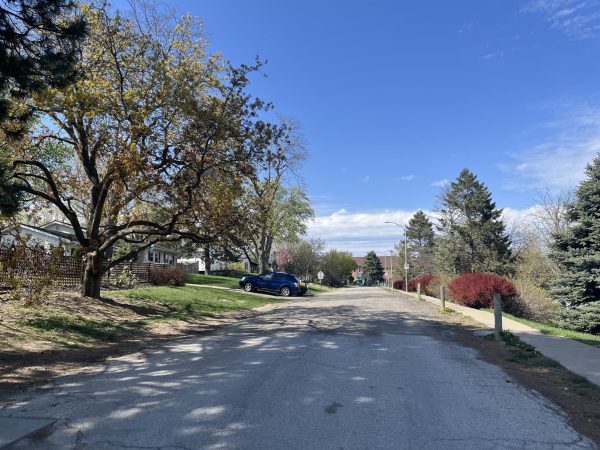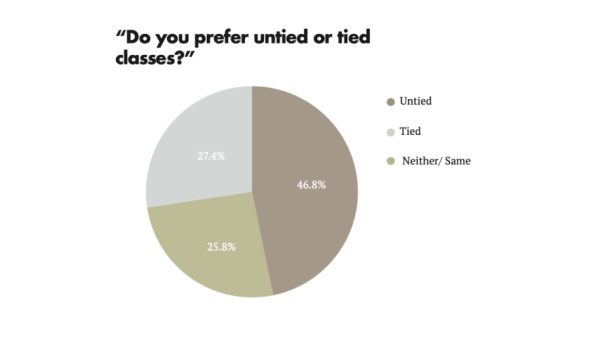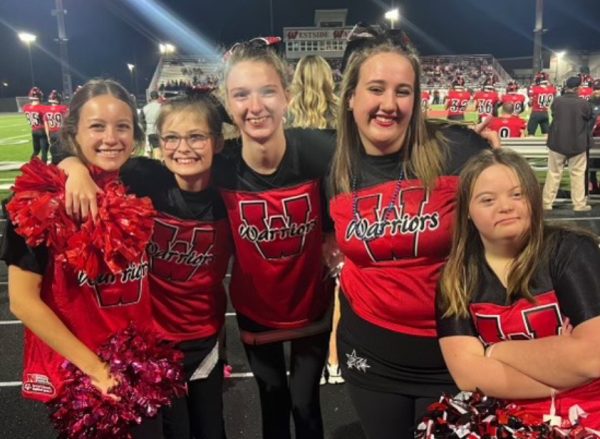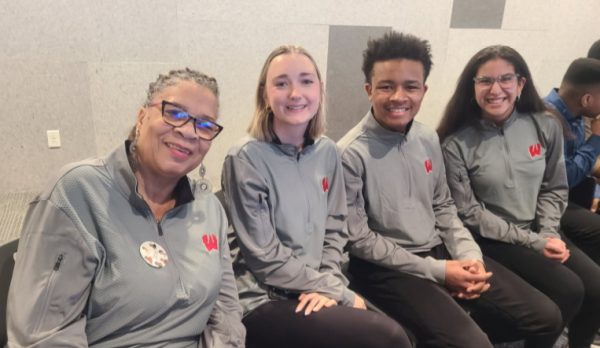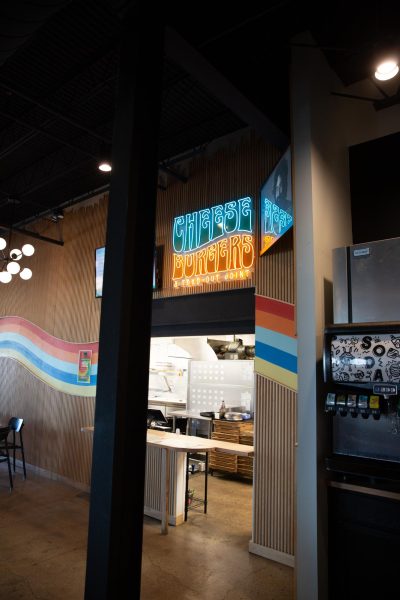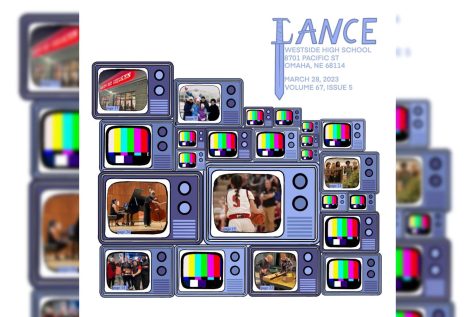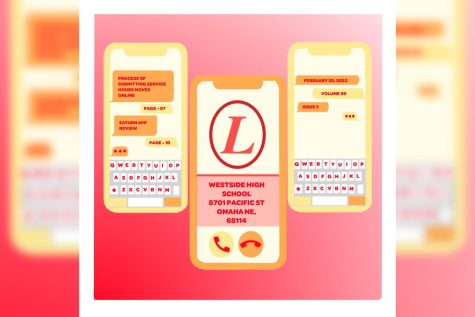Starving For a Sense of Control
Freshman Ella Kirkpatrick reflects on her battle with anorexia.
Image courtesy of Kirkpatrick’s mother, Cassandra Shea
Freshman Ella Kirkpatrick’s is covered in words that symbolize her experiences with anorexia as she poses for photos taken by her mother, Cassandra Shea.
It’s a daily battle, one I might be fighting for the rest of my life. That’s the scary part of a recovery story though: never knowing if yours will have a happy ending.
Around two years ago, I found myself shuffling through the doors of a Children’s Hospital building. Each step I took led me closer to the inevitable diagnosis I knew was coming. After just a few meetings with therapists, nutritionists and dieticians, I knew my diagnosis would be anorexia nervosa. Every aspect of myself had become my illness, yet putting the label on what had become my life still came as a shock to me.
The development of my anorexia turned my mind into a complex cocktail of chemical imbalances and bottled emotions. It was the biggest roadblock I’ve ever had put in front of me. In the time before my illness came to fruition, I never dealt with my emotions, whether they surrounded my parents’ divorce or a disappointing test score. Regardless of their source, the emotions I tried so hard to bury ended up eating me alive. I figured that maybe if I talked about any ugliness in my heart, from anger to shame, it just might make those feelings more impactful than if I kept them to myself. I thought if I never told anyone I was hurting, then I wasn’t hurting in the first place. If I never said I hated myself, then maybe I wouldn’t.
For as long as I can remember, I’ve struggled with debilitating Obsessive-Compulsive Disorder (OCD). So, I also never knew how to be okay with something not being the way I saw it in my head. Because of a lack of healthy emotional coping partnered with mental illness, it wasn’t an unlikely possibility that these would combine and start working against me more. They were also targeting how I viewed my worth and my body.
After a few years, I started to restrict how much I ate in an effort to heal my emotions and my view of myself and my body. These restrictions started taking over my life when I eliminated sweets and desserts from my diet. I realized I could cut the foods I perceived as “bad” or “evil” from my diet, and I couldn’t stop.
Next, I moved to restricting snacks to eliminate excess calories. This process of blaming food for how I perceived my body did nothing but continue to break me down until my calories never exceeded 600 a day. Twenty-three grams of carbs was an anxiety attack in a granola bar package, and a teaspoon of peanut butter just looked like a half hour on the Stairmaster.
I saw complex carbohydrates and calories in every crumb of my half-eaten slice of toast. I had nutrition labels and my caloric totals written behind my eyelids. It felt as though every last anatomical area of my brain was so chained down by my disorder that I couldn’t think of anything else.
Being told I looked healthy translated to someone saying I looked fat. My family saying I looked like a skeleton was a compliment. Starving was a success; dinner was a failure. I never saw that every day I was engulfed in anorexia was just another day of committing a slow suicide. I didn’t care if I couldn’t go up a flight of stairs at the middle school without my heart trying to escape through the indents of my rib cage because I had skipped my lunch.
I didn’t pay attention to the obvious stares in the health class lessons on eating disorders, because I always believed if they thought I was anorexic, then deep down they might admire it. One morning, I pried myself from my shower, Head and Shoulders shampoo still dripping from my hair, unable to finish simply bathing because I couldn’t breathe. I couldn’t stand. I couldn’t see anything but fuzzy static. That morning, I looked death in the eye, and it never even mattered because she had a 25 inch waist.
I never believed that my actions and thought processes were normal. I knew celery wasn’t a meal and that a bite of a Bratwurst wouldn’t make me obese, but it wasn’t something I could stop. It was never that simple. My friends and family tried everything they could think of to get me to eat. My mom would beg me to have a handful of pistachios, but I couldn’t help but hide them in my pockets to discard later. I’d bring a granola bar to school as my “breakfast” and pretend I’d eaten it to keep my friends and family off my back. Then it was just added to the bags of uneaten food I’d have to take back to school with me and throw out in the morning. This way there was no proof that I was starving myself. It’s funny to think that I didn’t know nearly everybody could already tell I wasn’t eating. All they had to do was glance in my direction.
I wanted to eat, but something in me couldn’t do it. It physically hurt me to think about possibly gaining half a pound, letting myself have a dinner roll or getting ice cream with the rest of the family without walking as fast as my legs would take me to the bathroom to purge in a matter of five minutes.
Anorexia is an eating disorder, but like the majority of these illnesses, it’s about so much more than just the food. Sure, my illness started with an aspect mainly focused on my body and weight, but I could see that it wasn’t completely about my body. In reality, it was an addiction and an emotional escape. It was never a choice. If anything, it was my mind trying to protect me from my emotions by killing me. It was a way I could control the parts of my life I had never healed from: the things that still throw me off to this day. But after months after being in recovery, I realized that it’s not a way to control your life: it’s the disorder controlling you. That’s a hell of a fight, and if I stayed in it I would not have recovered to where I am now.
My anorexia was never what I was taught in a health or psychology class. As accurate as the portrayal of clinical symptoms is, the emotional side of eating disorders is barely shown. I was never taught how eating disorders can break apart families, ruin friendships and completely stop an individual’s life. Now I know that these experiences are too personal and detailed to explain in a two hour lecture.
So often, the reality of eating disorders can be brushed aside because we never want to confront the pain they cause. Although, telling this story doesn’t hurt now because these words are so twisted by diagnoses and definitions. They are such a desensitized part of my life that I never truly want to relive. Hearing my grandfather tell me that maybe I wouldn’t bite my nails if I just ate something, or my brother marching in on me making blueberry scones for the family just to tell me, “That shirt makes you look anorexic,” are memories I will never unhear. These words will forever reverberate through my body, just to blur the image I see on my scale. They’ll try to convince me that the number will determine my worth or my beauty.
No matter how long ago these things were said, or how many months I spent in a recovery center just days after hearing them, I will never stop feeling the sting they left. In the end, I know I will never be able to push every memory of my disorder out of my head, but I don’t want to. Now I can look back and thank myself for being a survivor rather than a statistic. I know that anorexia is the worst yet best thing that has ever happened to me. Any eating disorder is no fun ride in the slightest, and if anything, it is absolute hell. But, without facing anorexia head on, I wouldn’t be half the fighter that I am today.
Your donation will support the student journalists of Omaha Westside High School. Your contribution will allow us to purchase equipment and cover our annual website hosting costs.
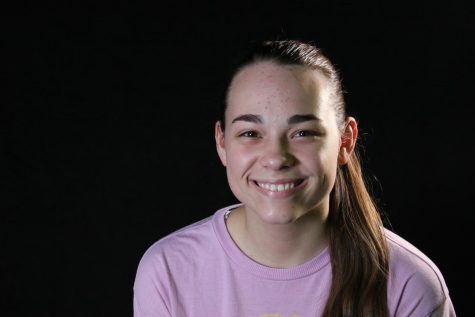
Hi, my name is Ella Kirkpatrick! I am a Graphic Designer and Staff Writer for Lance this year. I am currently a freshman and this is my first year on Lance....


